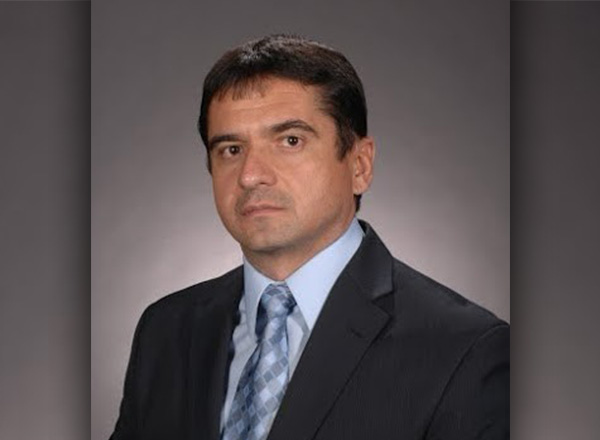HFC welcomes Dr. Sašo Krstovski, auto industry expert, as BEPD associate dean

After nearly 30 years at Ford Motor Company, Dr. Sašo Krstovski (pronounced “SAH-show Kerr-STOV-ski”) is applying his expertise to his new role as Associate Dean of Industrial Technologies, taking responsibility for the Advanced Manufacturing, Trade and Apprenticeship Education, Building Sciences, Automotive Technology, and ASSET programs in the HFC School of Business, Entrepreneurship, and Professional Development (BEPD). He reports to BEPD Dean Patricia Chatman.
“I’m looking forward to help grow the footprint of Industrial Technologies and support new programs,” said Krstovski. “HFC is an eminent academic institution known globally for its innovative programs and its history of being a supportive workplace. Industrial Technologies is why HFC was started in 1938. It is an honor to join HFC.”
“Dr. Krstovski's unique combination of an engineering and manufacturing background, his experience managing teams and overseeing complex projects while optimizing organizational workflows, and his commitment to effective teaching and learning based on real-world problem-solving make him an exceptional addition to our team,” said Chatman.
Krstovski is one of two new associate deans in BEPD. His colleague Naser Abumustafa is the new associate dean for Business and Economics, Computer Information Systems, Cisco, Cybersecurity, and Culinary Arts + Hospitality Management.
Earning his doctorate is his proudest accomplishment
The youngest of two, Krstovski was born in Raotince, Macedonia. His family immigrated to the United States when he was four years old. He lives in Macomb Township with Valentina, his wife of 27 years. They have two adult children.
Krstovski, who speaks English and Macedonian, graduated from Paul K. Cousino High School in Warren. He was 11 when he realized he wanted to make engineering his career.
“I enjoyed understanding how things functioned,” he said. “Whenever something wasn't working, I made an effort to repair it.”
A two-time alumnus of Wayne State University, he earned his bachelor’s degree in electrical engineering and his master’s degree in computer control systems. He earned his doctoral degree in manufacturing systems from Lawrence Technological University (LTU). He considers earning his doctorate his proudest accomplishment.
“It was a long journey,” he said. “With the support of my family, I was able to be successful.”
Krstovski is also a Six Sigma Level II Master Black Belt. Professional memberships include the Industrial Engineering and Operations Management Society International and the American Society of Quality.
The “Pied Piper of Manufacturing”
Krstovski’s career at Ford began in 1993 as a co-op student. He joined Ford full-time after he completed his bachelor’s degree in 1996. One of his colleagues called him the “Pied Piper of Manufacturing” because he was always helping his coworkers and recognizing them for their efforts, even the custodial staff.
“It is a very special recognition when colleagues show appreciation and truly respect the work you do to help them,” said Krstovski.
While at Ford, Krstovski served in a wide variety of positions, which increased in both technical and leadership responsibilities as he ascended the corporate ladder, including but not limited to process engineer, manufacturing planning specialist, systems analyst, electrical/controls engineer, launch and test engineer, Lean Manufacturing Coach (Six Sigma Black Belt), and ultimately, University Research Programs Manager.
“During the pandemic, I was appointed to a special assignment working on a respiratory assistance device,” he said. “I interacted with Ford’s Advanced Manufacturing and Research team and with several universities and medical professionals. The collaborative environment and the cause to help humanity was very fulfilling. Being part of this mission showed me how individuals can put personal ambitions aside and work together.”
Throughout his career at Ford, Krstovski served as a mentor to many and a staunch advocate for female engineers, so teaching was a part of his duties. His final position at Ford was University Research Programs Manager, where his duties included:
- Managing Ford’s portfolio of more than 100 unique research topics across multiple universities globally.
- Serving as liaison between Ford and university principal investigators on research projects.
- Guiding university research projects to align with corporate strategic objectives.
- Standardizing processes (i.e., export controls, disclosure agreements, etc.) to ensure compliance and streamline requirements to eliminate waste across the workstream.
A passion for efficiency
Krstovski has shared his expertise and professional experience in the college classroom, teaching courses in plant layout, automotive manufacturing, quality control, applied lean Six Sigma processes, and e-commerce at Oakland University, Central Michigan University, and LTU.
“I like passing my knowledge on to others,” he said. “I always was involved in teaching either on the job site or in the classroom within industry. My formal academic teaching started in 2019 at LTU.”
At some point in the near future, Krstovski hopes to return to the classroom.
“I have the ability to not only provide an education, but to also support students in changing their lives and the lives of the people around them,” said Krstovski. “Having a skill to earn gainful employment is life-changing. I want to inspire students to see beyond the classroom and envision themselves utilizing these skills within the workplace. Seeing yourself within a certain position will provide the significant grit to push through the obstacles and achieve graduation.”
He continued: “I aim to apply my industry expertise in operational excellence to enhance academic practices. My goal is to introduce my team to effective principles that have successfully driven process improvements in my previous roles. I hope to collaborate with them to adapt these principles to support our College's student-centered mission. I will coach the team on implementing these principles, guiding them in process improvement and problem-solving methodologies to foster a more efficient educational institution.”